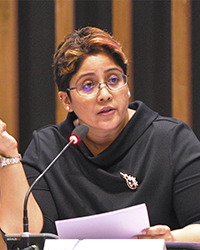< Return to program overview
Panel 3
|
Normative (Re-)ordering of Cyberspace

Miftahul Ulum
Dr. Miftahul Ulum is Head of the Political Science Department at University of Muhammadiyah Jakarta (UMJ), specializing in cybersecurity policy, and cyber governance in Indonesia and Asia. As a Chevening, Rio Tinto, and LPDP Scholar, he holds a PhD in Politics and International Studies (Warwick), an MSc in Global Security (Glasgow), and a Master’s in Policy Studies (UNSW). His research examines the intersection of technology and politics. As Convenor of Cyber Security Politics at UMJ, he influences Indonesia’s cyber policy debates. Combining political science, law, and technology, his interdisciplinary work addresses contemporary digital security challenges.

Tamara Nair
Dr. Tamara Nair is a Research Fellow at RSIS, Singapore, specializing in ASEAN power dynamics, labor biopolitics, and the Women, Peace, and Security (WPS) agenda. She represents Singapore in the ASEAN Women for Peace Registry and NTU in human rights education. With a PhD in Development Studies (UNSW), she also holds degrees in Political Science (NUS), Environmental Management, and Arts Research. Her work bridges policy and academia, focusing on gender, technology, and regional security. She actively contributes to ASEAN initiatives, advocating for inclusive governance and women’s leadership in conflict resolution and peacebuilding.

Jompon Pitaksantayothim
Jompon Pitaksantayothin is an Associate Professor of Law and Digital Technology at Hankuk University of Foreign Studies (South Korea). He previously worked as an Assistant Professor of Comparative Law at Mahidol University and also as a lecturer at UTCC and Burapha University (Thailand). He earned a PhD in Law from the University of Leeds, completed LLM degrees at the University of Edinburgh and the University of Warwick (UK), and holds an LLB from Thammasat University (Thailand). His expertise includes the legal and social dimensions of digital technology, human rights in cyberspace, and international law, with a comparative and interdisciplinary focus.

Bora Park
Dr. Bora Park directs INSS’s Hybrid Threat Research Center in South Korea, advising national agencies on counterterrorism and security strategy. She participated a UNOCT report on border security and holds a PhD in Criminology (Dongguk). A visiting fellow in Hungary, she examines transnational threats and hybrid warfare. Her expertise spans criminal justice, counterterrorism, and cyber-enabled extremism. Serving on academic boards, she bridges research and policy, enhancing Korea’s resilience against evolving security risks. Her work informs global best practices in threat prevention and crisis response.

Faby Izaura Y Barus
Faby Izaura Y. Barus serves as a senior officer at the ASEAN Institute for Peace and Reconciliation (ASEAN-IPR). Her thematic focus includes Preventing and Countering Radicalisation and Violent Extremism (PCRVE), counterterrorism, and cyber peacebuilding. She is actively involved in advancing regional initiatives that promote peace, resilience, and inclusive responses to non-traditional security challenges in Southeast Asia.
Abstract
Keynote
Fragmentation and Re-ordering in ASEAN Cybersecurity: Between Normative Ambitions and Geopolitical Realities
Amid intensifying global cyber tensions and a fragmenting international order, ASEAN stands at a strategic crossroads. Despite normative commitments under the ASEAN Cybersecurity Cooperation Strategy (2021–2025), the region’s cyber landscape remains fragmented, asymmetric, and vulnerable. This paper examines how internal divides and external geopolitical pressures undermine ASEAN’s capacity to forge a coherent and resilient cyber order, leaving it exposed to internal weaknesses and external manipulation.
The study employs a multi-method approach, combining a focus group discussion with 20 cybersecurity stakeholders, a regional survey of 103 participants from government, academia, civil society, and the private sector, and an extensive review of policy documents and literature. Findings reveal a self-reinforcing cycle of incoherence: policy misalignment and weak operational coordination create exploitable vulnerabilities; state and non-state actors amplify these through espionage, sabotage, and AI-driven disinformation; and the digital divide perpetuates asymmetries in capacity, trust, and resilience. In contrast to the European Union’s GDPR-based model of legal harmonization, ASEAN’s patchwork of divergent regulations—and the absence of joint threat intelligence platforms or attribution mechanisms—hinders collective defense against cross-border attacks.
The analysis situates these dynamics within the broader struggle between competing models of cyberspace governance. External powers, particularly the United States and China, exploit ASEAN’s divisions through digital power projection, while reliance on foreign digital infrastructure deepens dependency. Yet the research also identifies nascent pathways for “cyber re-ordering,” including proposals for a binding ASEAN Cybersecurity Act, the establishment of a Joint Threat Intelligence Platform, regional cyber drills, strengthened public–private collaboration, and ASEAN-wide digital literacy initiatives.
Ultimately, the paper argues that ASEAN’s cyber (dis)order reflects a broader governance dilemma: the tension between normative ambition, geopolitical complexity, and institutional capacity. It proposes a phased framework for cyber governance centered on regulatory convergence, trust-based diplomacy, and inclusive capacity-building—contributions that speak to global debates on digital sovereignty, regionalism, and the contested future of cyberspace.